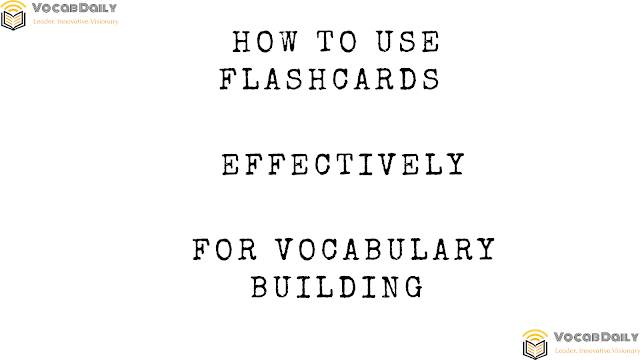How to Use Flashcards Effectively for Vocabulary Building
Building a strong vocabulary is a critical component of language learning for students of all ages. Flashcards, a tried-and-true method, remain one of the most effective tools for this purpose. When used strategically, flashcards can transform vocabulary acquisition into a dynamic, engaging, and highly effective process.
Why Flashcards Are Powerful for Vocabulary Learning
Flashcards are more than just simple learning tools. Their versatility and efficiency make them invaluable for mastering vocabulary. The portability, visual appeal, and interactive nature of flashcards allow learners to personalize their study process.
- Portability and Accessibility: Flashcards can be used anywhere, whether in physical or digital form, enabling consistent practice.
- Active Recall: The format encourages learners to actively retrieve information, a proven method for strengthening memory.
- Repetition: Regular review of flashcards ensures vocabulary retention over the long term.
Designing Effective Vocabulary Flashcards
Creating flashcards that are both functional and visually appealing is key to maximizing their effectiveness. A well-designed flashcard balances simplicity with the inclusion of essential information.
- Single Word Focus: Each card should feature one word, avoiding clutter and allowing for focused learning.
- Contextual Sentences: Including a sentence demonstrating the word in context aids understanding.
- Images: Visual learners benefit from associating words with relevant images.
- Pronunciation Guides: For language learners, phonetic spellings or audio cues enhance retention.
Incorporating Spaced Repetition with Flashcards
Spaced repetition is a scientifically proven method to combat forgetting and solidify learning. Flashcards are particularly effective for implementing this technique.
- Digital Flashcards: Apps like Anki and Quizlet automate spaced repetition, optimizing review schedules.
- Color-Coded Systems: Use different colors to categorize cards by difficulty or topic for targeted practice.
- Review Cycles: Schedule flashcard sessions at regular intervals, revisiting difficult words more frequently.
Creative Ways to Use Flashcards
Learning with flashcards doesn’t have to be monotonous. Adding variety keeps learners engaged and encourages consistent practice.
- Group Activities: Flashcard games such as matching pairs or charades foster collaborative learning.
- Storytelling: Use flashcards to create short stories, integrating the vocabulary for contextual learning.
- Timed Challenges: Set a timer and see how many flashcards can be reviewed or matched within a given period.
The Role of Digital Flashcards in Modern Learning
Technology has revolutionized the use of flashcards, making them even more interactive and accessible. Digital platforms enhance the traditional flashcard experience.
- Customizable Decks: Online tools allow for personalized vocabulary decks tailored to individual needs.
- Multisensory Features: Digital flashcards often include audio pronunciations, animations, and quizzes.
- Progress Tracking: Learners can monitor their progress and identify areas for improvement through integrated analytics.
Integrating Flashcards into Daily Routines
Consistency is the key to successful vocabulary building. Flashcards can easily become a seamless part of daily life.
- Morning Reviews: Start the day with 10-15 minutes of flashcard practice.
- On-the-Go Learning: Keep flashcards handy during commutes or breaks for quick study sessions.
- Daily Goals: Set achievable targets, such as mastering five new words a day.
Building Vocabulary Success with VocabDaily
Flashcards are a cornerstone of the VocabDaily Workbook Series, which provides a structured and engaging approach to vocabulary learning. Paired with the repetition and variety strategies outlined above, VocabDaily enhances vocabulary acquisition for learners of all ages.
Explore more effective vocabulary-building strategies and resources by visiting VocabDaily Official Blog. Dive deeper into structured practice with the VocabDaily Workbook Series.

Leave a Reply